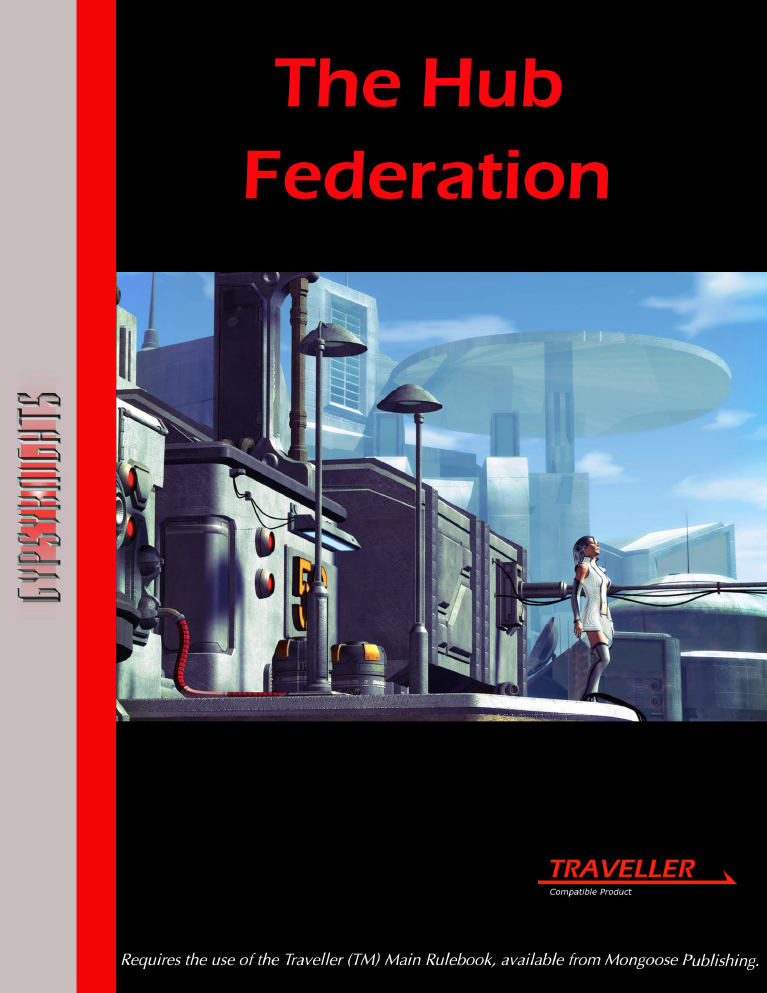Hub Federation
This review originally appeared on http://rpg-resource.org.uk in November 2014 and is reprinted here and in the January 2015 issue with permission.
 Hub Federation. John Watts
Hub Federation. John Watts
Gypsy Knights Games http://www.gypsyknightsgames.com
60pp. softcover or PDF
US$16.99(S+P)7.99(P)/UKú11.26(S+P)5.30(P)
Placed firmly in Gypsy Knights Games’s alternate Traveller universe, this book presents a discrete political unit that can be used as a basis and location for a range of adventures or even a whole campaign. It also provides a groundwork for using other Gypsy Knights Games books within the alternate setting, tying everything together neatly.
It begins by presenting the history of the Hub Federation, right back to pre-colonisation days when humans were exploring their own solar system and not much else. Then came the discovery of a starship drive based on quantum entanglement, the Zimm Drive, that could take a ship further and faster than hitherto imagined, roughly a parsec in a week. Moving out to the stars, a wormhole was discovered which led somewhere on the far side of the galaxy, opening near to an inhabitable solar system that was soon named The Hub as it was used as a base for exploring what lay beyond.
The next hundred years or so saw great expansion with many colonies being established. Some were independent, others beholden to whichever Earth government sponsored them. All manner of groups sponsored colonies, religious or philosophical groups seeking somewhere they could live out their ideas without interference, companies seeking to exploit natural resources and more soon scattered out from Hub across what in time became known as the Clement Sector. Trade flourished between the worlds, as well as back ‘home’ through the wormhole… until one day it just collapsed!
Nobody has yet discovered why the wormhole collapsed, but in the aftermath the President of Hub, one Fyodor Hauser, contacted the leaders of other worlds proposing an alliance to replace the former model of being governed from Earth. He also contacted the Admirals of various navies stationed nearby, some of them agreed to join but others did not. Likewise many worlds decided they’d be better off on their own, but several of the closest worlds joined the alliance. This was about ten years ago, and the year is now 2342.
If you do not want to use the alternate universe as is, you can abstract as much as you wish if you want to use these worlds, perhaps as a pocket empire somewhere on the fringes of known space.
Next we take a look at how the Hub Federation is governed. There is a small Senate, with each constituent world represented by a single Senator. Interestingly, it is completely left to each world to decide how that Senator is chosen. Then there is a President, whose role is as chief executive and commander-in-chief. The Senate is responsible for making laws, the President puts them into effect. The President is elected by the Senators from amongst their number with a term of office of ten years. The world for which he was a Senator must then find another to replace him.
The Federation governs at the highest level: common defense of the member worlds, a common currency, combatting interstellar crime, provision of a navy and the coordination of ground forces and diplomatic relations with other worlds. Everything else is left to individual worlds to deal with. The Hub military forces consist of the navy and marines, other worlds may have their own ground forces and limited naval ones—their ships may not be equipped with Zimm Drives and are limited to system defence roles.
On to wider matters, next comes a sub-sector map of the Hub sub-sector and UWPs of all its worlds, followed by greater detail of each of the member systems of the Hub Federation. (See Subsector Sourcebook 3: Hub for the other worlds.) Each comes with an astronomical overview of the system followed by more details of the inhabited world—its geography, atmosphere, government, laws, culture, etc. All the things the well-informed visitor might want to know. Although the governmental system is covered in each case, there’s one omission: how they pick their Senator to represent them in the Hub Federation. However in most cases it can be deduced from the way in which the world itself is governed.
This makes a neat Pocket Empire, or the core of the known colonies if you are using the alternate setting. Ideas for adventures spawn quite readily as you read, and some specific suggestions are made as well. The work ends with an overview of technogical changes between regular Traveller and this alternate setting, mostly dealing with the ramifications of the Zimm Drive. Overall, a fascinating concept and well worth a look.
 Freelance
Traveller
Freelance
Traveller